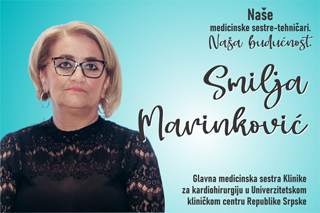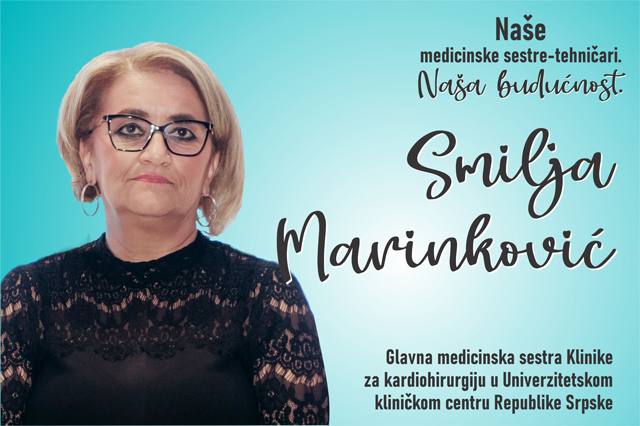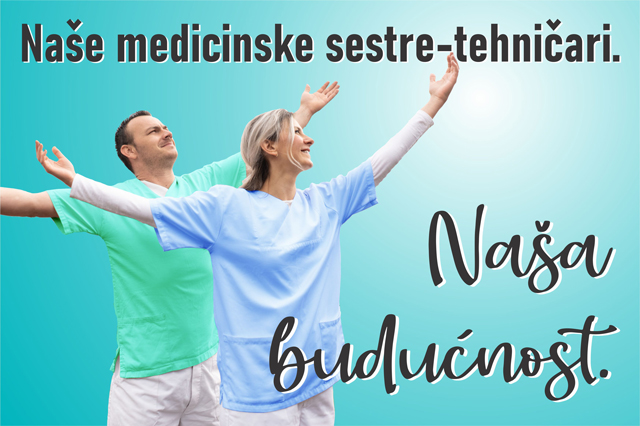
Smilja Marinkovic is the Head Nurse of the Cardiac Clinic at the University Clinical Center of the Republika Srpska. She holds University Degree in Healthcare Studies.
The beginning of a career and the key motive to choose this profession... I started working as a nurse when I was less than 20 years old. I was in the elementary school fifth grade when I decided that I would become a nurse. By chance, I was in a hospital with my parents visiting a patient and I observed a nurse caring for a seriously ill patient. On the way back home, I told my father that I would like after I finish elementary school to enroll in nursing high school. Luckily for me, I did. Now, after more than 30 years of continuous work as a nurse I would make the same choice again.
I was happy that my son also finished nursing school, because through my work I constantly talked about it being a demanding, responsible, but above all very humane profession. You feel so happy and nice when a patient tells you: "Thank you for everything you have done for me," or, "You have golden hands, you are very kind." It is something that motivates you to be a good person.
What does your typical working day look like? I am at work by 6:15am at the latest. First, I make morning rounds (general cardiac surgery and intensive care departments), talk to colleagues from the night shift about the condition of the patients during the night. I take the medical files of hospitalized patients with special focus to the preoperative preparation of patients who are scheduled for surgeries that day and attend the morning meeting that starts at 7 o'clock. After the meeting, morning bedside rounds are on the program. If necessary, also a short meeting with the unit head nurses. This is followed by the planning of the nurses' work schedule and necessary medication and medical materials procurement. Next steps are continuous communication with patients, preparation of documentation for consultations rounds and organization of work at the cardiac surgery clinic.
You were the first to register in the Nurses Register of Republika Srpska. How significant is it? Nurses register is very important. I could say a lot about its importance, but in short - we finally have the Register that we have been waiting for a long time. Until now, we have constantly talked about some assumptions, about the number of nurses with secondary school and higher education, and by registering in the Register we have accurate records for all health institutions. The Ministry of Health and Social Welfare of RS has insight into the number of nurses and their education levels. Nursing schools can plan the enrollment of new students according to the information provided in the Registry. Healthcare institutions have insight into the exact number of employees, their work experience, years of service and can plan their redistribution by job position accordingly and timely - train nurses who would replace those soon to be retired. We will not waste time training employees for a specific job position. We have insight into the exact number of nurses who work in intensive care, hemodialysis, hematology etc. Registry will provide nurses with opportunity to improve their knowledge through various educations, seminars and symposia, so that they can provide the best possible nursing care to our patients.
What aspects of work in your institution would you single out as challenging and what changes would you introduce to improve them? I do not see any significant issues in the institution where I work. Perhaps, as in most health care institutions, it is mainly a lack of health professionals, and we often face issues planning annual vacations, or in cases of unplanned absences from work i.e. sick leave. As far as changes are concerned, I would not change anything much, I would only suggest more regular trainings.
The position of nurses in BiH... The position of nurses in Bosnia and Herzegovina has slightly improved in the last ten years. However, in order to take advantage of the existing potential and enhance our position, it is necessary to invest in our profession, and to solve all the challenges and problems that we face, considering that nurses are a very important link in the entire health system.
How important are nurse-patient and nurse – doctor relationships? Nurses have a certain set of standards for communication with patients that must be respected. It is important that they communicate safely and efficiently with patients, build a therapeutic relationship, and apply verbal and non-verbal communication through different forms. The nurses communicate with all employees within their facility. In case of unhealthy or unclear communication, which cannot be allowed, we get dissatisfaction among coworkers which also reflects on patients.
What are the most common problems faced by health professionals in Bosnia and Herzegovina? Among the primary problems nurses face are low incomes and often inadequate working conditions. This is certainly one of the most stressful professions. They frequently meet and communicate with conflict patients. The fact is that nurses are the first contact for patients and their attendants and therefore they are often exposed to attacks and violence at workplace. Also, a significant problem faced by nurses is the lack of staff, because in such situations we are unable to provide patients with quality nursing care.
Professional development and importance of continuous education... Nursing is a dynamic field that is continuously evolving. Technologies are constantly advancing. In order to keep up with these changes, nurses should be involved in continuous education. Continuous education and learning are key aspects for improving knowledge, skills and competences. In this way, they keep up with novelties in healthcare, technologies, diagnostic and treatment methods. Participation in international and domestic congresses, meetings and courses greatly contribute to upgrading existing knowledge and skills.
The importance of education within the Strengthening Nursing in BiH project... Fami Foundation in cooperation with the Ministry of Health and Social Welfare of Republika Srpska made a significant contribution in strengthening nursing profession in
Bosnia and Herzegovina. In the last 12 years, education made a huge contribution to the development and improvement of this profession as witnessed. The donation of valuable equipment made the work of the health professionals easier. Thanks to knowledgeable and professional lecturers, nurses acquired and continue to acquire knowledge in various areas of health care, including management and leadership. The development of Standard Operating Procedures for secondary, tertiary and primary levels as well as for community nursing had a significant impact on the standardization of the nursing profession, and thus on the quality of services provided.
An unforgettable experience... There were a lot of unforgettable experiences, but I would still put the recent event that hit the whole world in the first place, which is the COVID-19 pandemic, when nurses were the first to be contacted by patients and who were their greatest support. Another unforgettable experience is my personal pleasure and I am grateful to the Ministry of Health and Social Welfare of RS as well as Fami Foundation that I was the first nurse to register in the Nurses Register.
The most important skills for a nurse... Empathy as a key trait that a nurse should have, more specifically the ability to perceive the feelings of another person and give meaning to that perception; acceptance of responsibility and obligations for one's own actions and results of nursing care provided within the legal framework of nursing practice; application of knowledge and skills performing activities that are in his/her domain of work; participation in health promotion and disease prevention activities, and development of communication skills.



